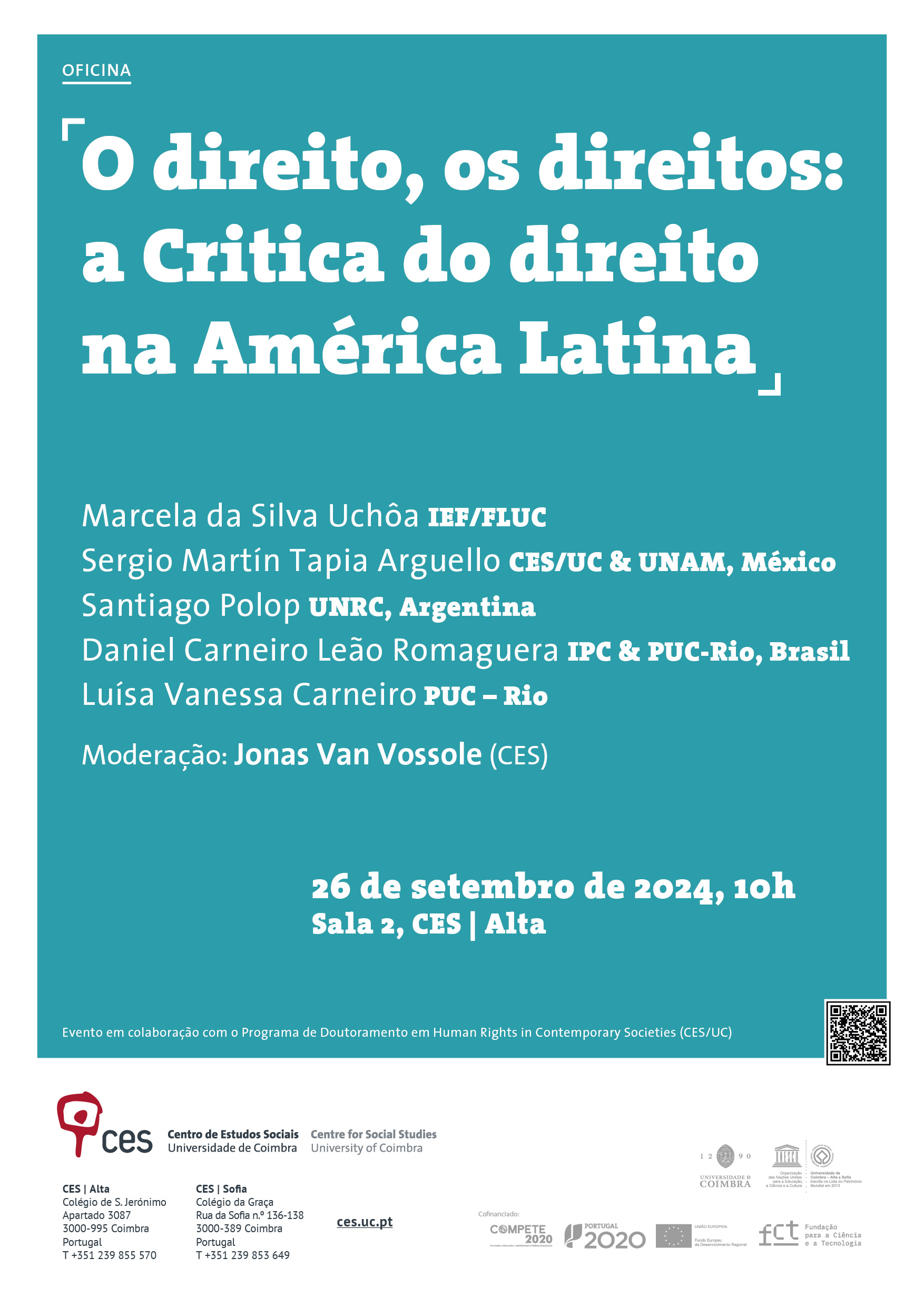Workshop
Law, rights: the Critique of law in Latin America
September 26, 2024, 10h00
Room 2, CES | Alta
Western modernity presents an exclusionary and closed view of the idea of “law” that does not correspond to the reality lived by people in their daily experience of legal relations. This has an impact on how the relationship between State and citizen is experienced, but also on how the political life of the community is practised.
However, different ways of perceiving legal reality do not correspond to this univocal view of reality, particularly in Latin America. In this event, four law professors/researchers from different Latin American countries - Marcela da Silva Uchôa (IEF/FLUC); Sergio Martín Tapia Arguello (CES/UC & UNAM, Mexico), Santiago Polop (UNRC, Argentina) and Daniel Carneiro Leão Romaguera (IPC & PUC-Rio, Brazil), Luísa Vanessa Carneiro (PhD student PUC-Rio) - will present some ideas on how the multiple experiences of Latin American societies present points of emergence for a different understanding of the hegemonic legal experience, especially in the practice of what is known as “human rights”.
Moderator: Jonas Van Vossole (CES)
This event is organised in collaboration with the Doctoral Programme in Human Rights in Contemporary Societies (CES/UC).
Bio notes
Marcela da Silva Uchôa | Philosopher, lawyer, Master in Philosophy, PhD in Political Philosophy from the University of Coimbra. Full member of the Institute of Philosophical Studies of the University of Coimbra (IEF). Visiting professor of Latin American Political Philosophy and collaborating researcher of the Observatory of Violence of the State University of Ceará, Brazil. Uchôa was a researcher of the KINDER project at CES/UC, a lecturer in Ethics, Philosophy of Law, Philosophy and Human Rights, Philosophy of Education and Theory of Knowledge at FVJ and Faculdades Cearenses. She was vice-president of the Association of Brazilian Researchers and Students for two terms. Uchõa is a member of the think tank Fórum Demos and the Lusophone Human Rights Observatory. She regularly contributes opinion articles to Público. She works in the fields of humanities, focusing on political philosophy, human rights, republicanism, feminist studies and critical theory. Her research centres on the themes of Care, Politics and Ethics.
Santiago Polop | Degree in Philosophy, PhD in Political Science. Professor in Philosophy of Law, Political Analysis and Ethics. Director of the Philosophy Department, Faculty of Human Sciences, National University of Río Cuarto, Argentina. Coordinator of the free course in Human Rights. His work and research themes are linked to complex thinking, normative multidimensionality and contemporary ethical-political processes, and particularly around the effects of neoliberalism on these fields of study.
Sergio Martín Tapia Argüello | Lawyer from the Benemérita Universidad Autónoma de Puebla. He has a Master's degree in Sociology from the Instituto de Ciencias Sociales y Humanidades (Puebla), in Law from the Universidad Nacional Autónoma de México and in Political Philosophy from the University of Genoa. He is currently a PhD candidate in the Human Rights in Contemporary Societies programme of the Centre for Social Studies of the University of Coimbra, as well as a guest lecturer at various institutions, such as the Catholic University of Portugal and the Escuela Libre de Derecho (Mexico). His work, based on Latin American Legal Criticism, aims to critically analyse ideas of juridicity, law and human rights today.
Daniel Carneiro Leão Romaguera | Brazilian professor and researcher in law and related humanities fields, with a transdisciplinary approach to the study of public and social law issues. His main research themes are Human Rights, Critical Legal Theory, Contemporary Political Philosophy and Society/Law. He has a PhD in State Theory and Constitutional Law from the Pontifical Catholic University of Rio de Janeiro (PUC-Rio) and also in Public Law from the University of Nanterre (Paris X). Romaguera holds a master's degree in Jurisdiction and Human Rights at the Catholic University of Pernambuco, with a research period at the Vale do Rio dos Sinos University (UNISINOS). He did post-doctoral studies in Communication at the Federal University of Pernambuco (UFPE), in Law at the Pontifical Catholic University of Rio de Janeiro (PUC-Rio) and in Political Theory at the Humboldt University of Berlin (HU). Romaguera is currently a professor at the Polytechnic Institute of Coimbra, and is part of the ‘Esferas da Cidadania’ (Spheres of Citizenship) (PUC-Rio and Humboldt University) and ‘Human Rights and Violence: Government and Governance’ (Unesco Chair and Unitwin Network) research teams.
Luísa Vanessa Carneiro | PhD candidate in Law at the Pontifical Catholic University of Rio de Janeiro (PUC-Rio). Master's in Law from the Catholic University of Pernambuco (UNICAP). Researcher on the research project Critical Theory of Law, under the CAPES/DAAD programme: ‘Esferas da Cidadania’ (Spheres of Citizenship) in Rio de Janeiro and Berlin: Rights, Frontiers, Agencies (PUC-Rio/CNPq). Researcher at G-Pense! - Research Group on Contemporaneity, Subjectivities and New Epistemologies (UPE/CNPq). Member of the Diversity and Inclusion Council of the Law Department of the Pontifical Catholic University of Rio de Janeiro (PUC-Rio).
Jonas Van Vossole | BA and MA in Political Science, International Relations and Economics from the University of Ghent in Belgium. PhD in Political Science (Democracy in the 21st century - CES/FEUC) from the University of Coimbra. He is currently an individual FCT researcher at the Centre for Social Studies at the University of Coimbra, co-coordinator of the Ecology and Society Lab (ECOSOC) and regional coordinator for the central region of the Portuguese Political Economy Association. Van Vossole was a researcher at the Ghent University Association for the Study of Parties and Participation (GASPAR) and his academic and political activism career is deeply linked to Latin America and Brazil. His main research themes are democratic theory, social movements, labour, critical theory, geopolitics, Marxism and political ecology.


